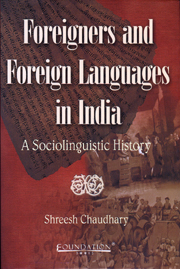Book contents
- Frontmatter
- Contents
- List of Annexes
- Notation Used for Transcribing Non-English Words, Names, Etc.
- Foreword
- Preface
- Acknowledgements
- 1 Introduction
- 2 Greek, Hebrew and Sanskrit
- 3 Arabic, Persian and Turkish
- 4 Armenian, Portuguese, Dutch and French
- 5 East India Company and The Indian Languages
- 6 East India Company and The English Language
- 7 Conclusion
- Index
4 - Armenian, Portuguese, Dutch and French
Published online by Cambridge University Press: 26 October 2011
- Frontmatter
- Contents
- List of Annexes
- Notation Used for Transcribing Non-English Words, Names, Etc.
- Foreword
- Preface
- Acknowledgements
- 1 Introduction
- 2 Greek, Hebrew and Sanskrit
- 3 Arabic, Persian and Turkish
- 4 Armenian, Portuguese, Dutch and French
- 5 East India Company and The Indian Languages
- 6 East India Company and The English Language
- 7 Conclusion
- Index
Summary
Introduction
After Alexander the Great, India had little contact with Europe. The land route between Europe and India came under the control of Iranians, Turks and Arabs. Occasionally, some Europeans, such as Marco Polo (ad 1254–1324), did cross through, but they were few and far between. They had no impact on the languages of India. ‘In a moderately trustworthy account of India to the ears of Europe’, Marco Polo, the famous Venetian traveller, described the Island of ‘Seilan – the best island in the whole world’, and ‘Malabar’ as ‘the best of all the Indias’. The first word referred to Sri Lanka, and the next to what is known as Kerala today. Marco Polo also found Jews in Quilon who still retained ‘their own language’. Portuguese reports on the wealth, trade and Christianity of South India later confirmed Marco Polo's conclusions.
After the Portuguese Admiral Vasco da Gama (ad 1469–1524) discovered the sea route, Europeans came again to India, this time in large numbers. This time they came to promote their trade and their Christian religion. By the early seventeenth century, several cities in India had merchants and missionaries from Europe. They also founded new cities. Thus, Portuguese stayed in Goa; Dutch occupied the Coromandel coast; Englishmen went to Surat, Bombay, Madras, and Calcutta; Danes went to Serampore in Bengal and French occupied Chandernagar and Pondicherry. Besides bringing trade and Christianity, Europeans did a variety of jobs in India – that of doctors, painters, military officers and advisers.
- Type
- Chapter
- Information
- Foreigners and Foreign Languages in IndiaA Sociolinguistic History, pp. 236 - 303Publisher: Foundation BooksPrint publication year: 2008



